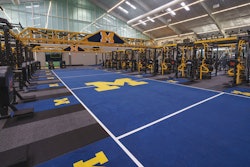Dianne Layden, a registered nurse, had been a member of No Limits Fitness for nine months when she hired Angela Plante to provide personal training services. Plante, a certified personal trainer at the club, designed an exercise program in March 2007, and Layden performed the exercise program on her own for three months. At that point, having grown "tired of doing the same exercises," Layden asked Plante to teach her a new program, advising the trainer that she had a history of back problems and a herniated disc. Plante instructed Layden during a single training session, during which Layden did not experience any discomfort, but she experienced mild back pain shortly afterwards and for the next day. In spite of that, Layden returned to the club two days later and repeated the program without supervision. She later acknowledged that her discomfort was apparent from the first squat, performed on a Smith machine, but she continued to do 14 more.
Should the personal trainer and fitness center owner be held liable in such a case? The Albany County Supreme Court said no, relying on the theory of assumption of risk and noting that Layden had signed a waiver releasing the club from liability for negligence.
However, in Layden v. Plante, the Appellate Division of the Supreme Court of New York, Third Department, declined (in a 3-2 decision) to apply the doctrine of assumption of risk, a natural defense under the circumstances. In many states, the doctrine generally provides that a person who voluntarily participates in recreational or athletic activities is deemed to consent to the commonly appreciated risks inherent in that activity. The court noted, however, that a participant does not assume the risk of injury resulting from a dangerous condition over and above the usual dangers inherent in the activity. Furthermore, the court held that the doctrine of assumption of risk must be "closely circumscribed" and limited to apply in the context of pursuits "both unusually risky and beneficial," among other things.
In Layden, the court made clear that plaintiff's experience as a weight lifter and her own testimony established that the defendants had met their initial burden on summary judgment to establish that Layden knew of the risks, appreciated their nature and voluntarily assumed them. However, the court held that issues remained as to whether the trainer unreasonably heightened the risks to which the client was exposed. For example, Layden submitted affidavits from two personal training experts who opined that the Smith squat - even when properly performed - is contraindicated for a person with a herniated disc because of its purported stress on the spinal column and lower back. Therefore, this exercise should not have been on Layden's exercise program in the first place. Layden's experts also averred that the trainer's direction and instruction to the plaintiff to "stick her butt out" while performing the Smith squat was not consistent with the safe performance of the exercise (she should have been instructed to keep her back straight). Therefore, the court determined that a jury would need to resolve the question of whether the trainer's direction to perform a Smith squat or to perform it with improper instructions (or both) unreasonably increased the risk of injury.
The court also weighed in on the release relied upon by No Limits Fitness, highlighting the importance of a clear, carefully drafted liability release. The court found that No Limits Fitness' release was, in fact, limited and that it was unenforceable as a matter of law. Although the release did not purport to exempt the defendants from liability for their own negligence, the release was not precise about what conduct on the part of the defendants it did release. The wording of the release failed to make any reference to the fitness center or its employees, but instead simply enumerated activities on the plaintiff's part that would not lead to liability from the use of the facility. The court held that this was not enough.
No Limits Fitness and Plante will have an opportunity at trial (the case was sent back to the lower court for further proceedings) to persuade a jury about their defenses. A jury will have the last word on whether the inclusion of the Smith squat exercise in Layden's exercise program, or Plante's allegedly improper instruction (or both) unreasonably increased the risk of injury to Layden. Jurors will also have to decide whether No Limits Fitness can be held responsible for Plante's actions, depending on whether she is found to be an independent contractor rather than an employee of the fitness center.
































